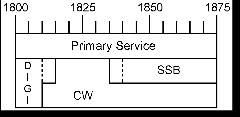160 metres: Difference between revisions
(qualify "lowest-frequency band", UK has a small sliver of 136kc longwave) |
|||
| (One intermediate revision by the same user not shown) | |||
| Line 15: | Line 15: | ||
Most amateur [[HF]] equipment supports the 160 metre band. However, it can be challenging to put up a full-size antenna on this band. Many operators use an [[inverted-L antenna]] for 160. | Most amateur [[HF]] equipment supports the 160 metre band. However, it can be challenging to put up a full-size antenna on this band. Many operators use an [[inverted-L antenna]] for 160. | ||
As one wavelength is one tenth of a mile, antennas tend to be large and require a large amount of land space, leaving fewer stations able to efficiently transmit on this band compared to the more popular [[HF]] frequencies. This smaller number of users has resulted in 160 metres being given the nickname of the "gentleman's band". | |||
== Modulation == | == Modulation == | ||
| Line 23: | Line 25: | ||
Radio communication on 160 metres is prone to extreme [[Propagation#Propagation_Theory_.28unfinished.29|D-layer]] absorption during the day. This typically limits communication to 75 miles. At night, however, the [[Propagation#Propagation_Theory_.28unfinished.29|D-layer]] weakens and contacts can be mode over thousands of kilometres. Like the [[HF]] bands, 160 metres usually supports such long-distance communication through [[refraction]] of signals via the [[Propagation#Propagation_Theory_.28unfinished.29|F2 layer]]. | Radio communication on 160 metres is prone to extreme [[Propagation#Propagation_Theory_.28unfinished.29|D-layer]] absorption during the day. This typically limits communication to 75 miles. At night, however, the [[Propagation#Propagation_Theory_.28unfinished.29|D-layer]] weakens and contacts can be mode over thousands of kilometres. Like the [[HF]] bands, 160 metres usually supports such long-distance communication through [[refraction]] of signals via the [[Propagation#Propagation_Theory_.28unfinished.29|F2 layer]]. | ||
Natural noise levels (QRN) are high on this band and signals are more vulnerable to impulse noise at low frequencies, rendering operation somewhat more difficult than on higher-frequency bands. The band had also long been subject to interference from marine navigation systems such as LORAN, although the replacement of these systems by GPS has largely eliminated this issue. | |||
==Australian Bandplan== | ==Australian Bandplan== | ||
Latest revision as of 20:09, 5 June 2009
Related wiki pages Bands, Propagation Antennas
| Band: 160 meters | |
| Bands | |
| 160m 80m 60m 40m 30m 20m 17m 15m 12m 10m 6m 4m 2m 1.25m 70cm 33cm 23cm 3cm | |
| Band Privileges | |
| US Extra | 1.800-2.000 |
| US Advanced | 1.800-2.000 |
| US General | 1.800-2.000 |
| US Technician | None |
| UK (all) | 1.81-2.0 (1.85 up sec.) |
160 metres, often known as Top Band, is technically a Medium Frequency (MF) band, the only one licensed to amateurs. It is slightly higher in frequency than the AM broadcast band (540 kHz - 1600 kHz), and behaves similarly. 160 meters is in many countries the lowest-frequency band on which amateurs are licensed to operate.
Equipment
Most amateur HF equipment supports the 160 metre band. However, it can be challenging to put up a full-size antenna on this band. Many operators use an inverted-L antenna for 160.
As one wavelength is one tenth of a mile, antennas tend to be large and require a large amount of land space, leaving fewer stations able to efficiently transmit on this band compared to the more popular HF frequencies. This smaller number of users has resulted in 160 metres being given the nickname of the "gentleman's band".
Modulation
Operation on the 160 metre band is primarily CW and SSB, but operators also use modes appropriate for HF such as RTTY and SSTV.
Propagation
Radio communication on 160 metres is prone to extreme D-layer absorption during the day. This typically limits communication to 75 miles. At night, however, the D-layer weakens and contacts can be mode over thousands of kilometres. Like the HF bands, 160 metres usually supports such long-distance communication through refraction of signals via the F2 layer.
Natural noise levels (QRN) are high on this band and signals are more vulnerable to impulse noise at low frequencies, rendering operation somewhat more difficult than on higher-frequency bands. The band had also long been subject to interference from marine navigation systems such as LORAN, although the replacement of these systems by GPS has largely eliminated this issue.
Australian Bandplan
Access : Advanced licencees only
1.800 - 1.810MHz Digital modes
1.810 - 1.840MHz CW only
1.840 - 1.875MHz SSB/AM
| Bands | |
| HF and MF | 160 metres * 80 metres* 60 metres * 40 metres * 30 metres * 20 metres * 17 metres * 15 metres * 12 metres * 10 metres |
| VHF | 6 metres * 4 metres * 2 metres * 1.25 metres |
| UHF | 70 centimetres * 33 centimetres * 23 centimetres * 13 centimetres |
| Microwave | 9 centimetres * 6 centimetres * 3 centimetres * 1.25 centimetres * Bands above 24GHz |
| See also | US bandplan |
